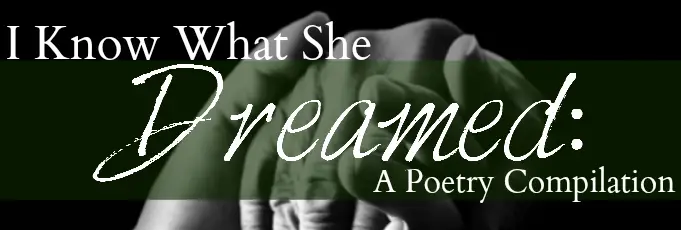By: Cherise Taylor
 Oh, dear Willow,
Why do you cry?
I stand before you,
seeing your rough brown face disappear
behind the covering of your dark arms and wild hair.
As clear droplets filter down through the split ends of
your golden-green locks, I wonder what causes the ache inside
your bones. And I wonder what will heal it.
Your tears hit the ground, some on grass, withering because
of the salt in the meager touches of your aching limbs.
some hit the sidewalk, the grey rock, seeping up the water.
in dark spots it drops, until the rock soaks it in like a stony wasteland,
drinking ‘til it can drink no more.
I gaze through a window, frosted by the mist of your tears.
I rub my wool sleeve across the glass, hoping for a clearer view.
But all I earn is a smudged reflection of the outside world,
ever misted by your tears.
A young man comes out into the open, trudging head down,
feeling your weeping droplets spray across his calloused skin.
As he walks, I can feel with him,
the soft droplets on my own face.
Coming toward my window, he raises his head.
His tawny hair falls back from his face and reveals wet cheeks.
But they are not wet with your tears, no.
Instead, wet with salty oceans from his own bleeding soul.
His head lowers again, as though he feels my eyes upon his face.
He trudges over the grass, black sneakers squishing through
pools of your cold, abandoned sobs.
Do you see him as he approaches, lifting back soft
tendrils of your hair to escape from the watching eyes,
Just as you do?
The boy sits, with his side pressed against your crooked,
knotted back. He curls his head between his knees and hides,
pressing close against your rough skin.
As he leans against you,
sharing in a grief that swells your soul as well as his,
the splatting sound of your tears softens against my window pane.
Pressed close to each other, huddled in each other’s touch,
you both seem a little stronger.
Oh, dear Willow,
Why do you cry?
I stand before you,
seeing your rough brown face disappear
behind the covering of your dark arms and wild hair.
As clear droplets filter down through the split ends of
your golden-green locks, I wonder what causes the ache inside
your bones. And I wonder what will heal it.
Your tears hit the ground, some on grass, withering because
of the salt in the meager touches of your aching limbs.
some hit the sidewalk, the grey rock, seeping up the water.
in dark spots it drops, until the rock soaks it in like a stony wasteland,
drinking ‘til it can drink no more.
I gaze through a window, frosted by the mist of your tears.
I rub my wool sleeve across the glass, hoping for a clearer view.
But all I earn is a smudged reflection of the outside world,
ever misted by your tears.
A young man comes out into the open, trudging head down,
feeling your weeping droplets spray across his calloused skin.
As he walks, I can feel with him,
the soft droplets on my own face.
Coming toward my window, he raises his head.
His tawny hair falls back from his face and reveals wet cheeks.
But they are not wet with your tears, no.
Instead, wet with salty oceans from his own bleeding soul.
His head lowers again, as though he feels my eyes upon his face.
He trudges over the grass, black sneakers squishing through
pools of your cold, abandoned sobs.
Do you see him as he approaches, lifting back soft
tendrils of your hair to escape from the watching eyes,
Just as you do?
The boy sits, with his side pressed against your crooked,
knotted back. He curls his head between his knees and hides,
pressing close against your rough skin.
As he leans against you,
sharing in a grief that swells your soul as well as his,
the splatting sound of your tears softens against my window pane.
Pressed close to each other, huddled in each other’s touch,
you both seem a little stronger.
 Oh, Little Book,
how I long to pick you up off the shelf.
To dust off your cover and read you through,
from one dust jacket to the other.
I wish to read you once again as I did as a child.
I loved you as though I comprehended
the incomprehensible depth of every word you leaked out before me.
I lived to love you and caress the very edges of your infinite knowledge
with my young, undeveloped mind.
I want to memorize your words.
Perhaps then I would have something to say
when my own tongue fails in speech.
I wish I could, but I can’t.
I don’t have time.
And if I am at all honest with myself I will never have time.
I should make time for you, Little Book.
But there’s no time to make.
Oh, Little Book,
how I long to pick you up off the shelf.
To dust off your cover and read you through,
from one dust jacket to the other.
I wish to read you once again as I did as a child.
I loved you as though I comprehended
the incomprehensible depth of every word you leaked out before me.
I lived to love you and caress the very edges of your infinite knowledge
with my young, undeveloped mind.
I want to memorize your words.
Perhaps then I would have something to say
when my own tongue fails in speech.
I wish I could, but I can’t.
I don’t have time.
And if I am at all honest with myself I will never have time.
I should make time for you, Little Book.
But there’s no time to make.
I Know What She Dreamed
Marie sits with one nurse at an empty table. The uniformed woman with the clothes pin smile holds out a forkful of eggs and tells her to “open up”. Marie doesn’t listen. She makes a frustrated barking sound, the only noise she can make anymore. I pick up a plate to the old woman’s left. “Well, what do you want then?!” the nurse snaps. I know what Marie wants. She wants crisp bacon. She wants eggs that come from a hen house, not from a refrigerated carton. She wants toast that isn’t black and crumbling on one side. I shake my head. I know what she wants. She wants to go home. But she will never go home. The nurse is gone now. Marie sits in her wheel chair, staring across the room, hands held up near her chest, eyes wide. I move closer to her, scrubbing her tabletop, moving around her. Her eyes are far away and her lips smile. Then, she looks at me. She is daydreaming, I decided. But how can that be? What does a woman of such an age have left to dream about? And so I ask her, “Marie, what do you dream about?” She looks at me with her serious blue eyes, and her hands start to shake. “It’s just a tremor,” someone says. “Just age.” I don’t believe it. Her hands shake with longing. They shake with longing to answer me. Marie wants me to know what she is dreaming. With her shaking and her eyes, she tries to say What her voice no longer can. I know the secrets that no one else does. Because now I know what elderly, voiceless people dream about. If she could speak, she would tell me to stop wasting time. She would make sure I did all I could to make a better future for myself. She would be certain that I never made the same mistakes she did when she was young. She would tell me to run and never come back to this place again. Next time, they might not ever let me leave. She does not want me to be stuck here like her. I have too much life to live. Every day, I walk away with those eyes following me, those words burning into me, forming a tremble in my soul from the shaking of her hands. It is a custom now. I bring her slimy bacon, scrambled eggs from a carton, and burnt toast. Marie tells me what she dreams. She dreams of going home. Today, it is different. I go over to the table and the nurse looks up at me. Marie smiles at me, eyes sparkling and points across the room. There is something there she wants me to see. I look, but nothing is there. There never is. That corner table is always empty. “She’s hallucinating,” the nurse tells me. “There’s nothing there, Marie.” I look down at Marie and study her eyes. The nurse is wrong. Marie sees what none of us can see. She sees the celestials. She hears them calling to her, “Just hold on a little longer.” Two hours later I hand in my cards and sign the paper. My contract is terminated. I will not be back here again. As I walk down the hall, past the dining room, I peek inside. Marie is still there with the clothes pin nurse, pointing, trying to convince us all that something is there in the corner. She barks and points. “Good bye, Marie,” I whisper. Tomorrow, I will go home. My father will come to me with the Sterling newspaper. He will point to obituaries and tell me, “An old lady from the Manor died last night. Did you know her?” I will look out the kitchen window. Then I will say, “Yes. I knew what she dreamed.”Oh, Dear Willow…
 Oh, dear Willow,
Why do you cry?
I stand before you,
seeing your rough brown face disappear
behind the covering of your dark arms and wild hair.
As clear droplets filter down through the split ends of
your golden-green locks, I wonder what causes the ache inside
your bones. And I wonder what will heal it.
Your tears hit the ground, some on grass, withering because
of the salt in the meager touches of your aching limbs.
some hit the sidewalk, the grey rock, seeping up the water.
in dark spots it drops, until the rock soaks it in like a stony wasteland,
drinking ‘til it can drink no more.
I gaze through a window, frosted by the mist of your tears.
I rub my wool sleeve across the glass, hoping for a clearer view.
But all I earn is a smudged reflection of the outside world,
ever misted by your tears.
A young man comes out into the open, trudging head down,
feeling your weeping droplets spray across his calloused skin.
As he walks, I can feel with him,
the soft droplets on my own face.
Coming toward my window, he raises his head.
His tawny hair falls back from his face and reveals wet cheeks.
But they are not wet with your tears, no.
Instead, wet with salty oceans from his own bleeding soul.
His head lowers again, as though he feels my eyes upon his face.
He trudges over the grass, black sneakers squishing through
pools of your cold, abandoned sobs.
Do you see him as he approaches, lifting back soft
tendrils of your hair to escape from the watching eyes,
Just as you do?
The boy sits, with his side pressed against your crooked,
knotted back. He curls his head between his knees and hides,
pressing close against your rough skin.
As he leans against you,
sharing in a grief that swells your soul as well as his,
the splatting sound of your tears softens against my window pane.
Pressed close to each other, huddled in each other’s touch,
you both seem a little stronger.
Oh, dear Willow,
Why do you cry?
I stand before you,
seeing your rough brown face disappear
behind the covering of your dark arms and wild hair.
As clear droplets filter down through the split ends of
your golden-green locks, I wonder what causes the ache inside
your bones. And I wonder what will heal it.
Your tears hit the ground, some on grass, withering because
of the salt in the meager touches of your aching limbs.
some hit the sidewalk, the grey rock, seeping up the water.
in dark spots it drops, until the rock soaks it in like a stony wasteland,
drinking ‘til it can drink no more.
I gaze through a window, frosted by the mist of your tears.
I rub my wool sleeve across the glass, hoping for a clearer view.
But all I earn is a smudged reflection of the outside world,
ever misted by your tears.
A young man comes out into the open, trudging head down,
feeling your weeping droplets spray across his calloused skin.
As he walks, I can feel with him,
the soft droplets on my own face.
Coming toward my window, he raises his head.
His tawny hair falls back from his face and reveals wet cheeks.
But they are not wet with your tears, no.
Instead, wet with salty oceans from his own bleeding soul.
His head lowers again, as though he feels my eyes upon his face.
He trudges over the grass, black sneakers squishing through
pools of your cold, abandoned sobs.
Do you see him as he approaches, lifting back soft
tendrils of your hair to escape from the watching eyes,
Just as you do?
The boy sits, with his side pressed against your crooked,
knotted back. He curls his head between his knees and hides,
pressing close against your rough skin.
As he leans against you,
sharing in a grief that swells your soul as well as his,
the splatting sound of your tears softens against my window pane.
Pressed close to each other, huddled in each other’s touch,
you both seem a little stronger.
Time for You
 Oh, Little Book,
how I long to pick you up off the shelf.
To dust off your cover and read you through,
from one dust jacket to the other.
I wish to read you once again as I did as a child.
I loved you as though I comprehended
the incomprehensible depth of every word you leaked out before me.
I lived to love you and caress the very edges of your infinite knowledge
with my young, undeveloped mind.
I want to memorize your words.
Perhaps then I would have something to say
when my own tongue fails in speech.
I wish I could, but I can’t.
I don’t have time.
And if I am at all honest with myself I will never have time.
I should make time for you, Little Book.
But there’s no time to make.
Oh, Little Book,
how I long to pick you up off the shelf.
To dust off your cover and read you through,
from one dust jacket to the other.
I wish to read you once again as I did as a child.
I loved you as though I comprehended
the incomprehensible depth of every word you leaked out before me.
I lived to love you and caress the very edges of your infinite knowledge
with my young, undeveloped mind.
I want to memorize your words.
Perhaps then I would have something to say
when my own tongue fails in speech.
I wish I could, but I can’t.
I don’t have time.
And if I am at all honest with myself I will never have time.
I should make time for you, Little Book.
But there’s no time to make.



Wonderful, Cherise! I loved them all, but I think “I Know What She Dreamed” was my favorite. Beautiful, haunting tone and an important message.
Thanks for sharing! 🙂
The poems are really beautiful and you wrote them really well.
At the beginning of this comment section they tell me to speak my mind. The problem is I definitely don’t want to hurt anyone with the contents of my mind on this issue. Let me see if I can say this is a good way. I loved reading what you wrote, Cherise, it was beautiful especially, the first one, “I know What She Dreamed.” It was so beautiful and true. But I guess, I’m having trouble framing it as poetry. It’s beautiful, it flows smoothly, but poetry has meter and rhyme. I always thought that poetry was defined by these things… is it? Am I being too rigid? I guess I would classify what you wrote as lovely prose, but not poetry. Am I being too harsh, let me know, I would like to have some insight on what a good definition of poetry is. ~ But, Absolutely beautiful, anyhow!
That’s a good question, Christianna, and thank you for voicing your honest thoughts in a respectful manner! I don’t think you were harsh at all.
“I Know What She Dreamed,” is indeed a poem. There are many types of poetry, and while I am not a poetry guru like those on our poetry review board, I believe this kind of poem would be categorized as “Free Verse.” Free Verse, by definition, “is poetry written with rhymed or unrhymed verse that has no set meter to it.” – https://www.youngwriters.co.uk/types-free-verse
For the longest time, I thought all poems had to rhyme and follow a certain set pattern, but as it turns out, poetry can be very diverse.
Thanks for the comment!
Reagan
Wonderful, thank you so much!
Not all poetry has meter and rhyme. Some of it is free verse which means that it has none of those things.
When writing this, I’d just finished my third class in writing poetry.